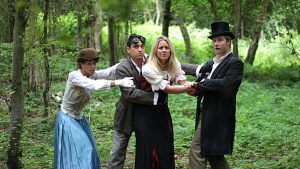“Tales from Shakespeare” is the title of a children’s book written by Charles and Mary Lamb and published in 1807, and now Michael Morpurgo (author of “War Horse” and other stories for children) has made his own selection of Tales from Shakespeare.
Morpurgo says he loves Shakespeare (who apparently came to Rye once) for the sound of the words, and the beauty of the language, and he wants to share his appreciation with young people and to introduce them early to the greatest English playwright and writer. He recognises, he says, the importance of storytelling in the process of creative learning.
And he found a ready ear, discussing his project with Greg Doran, the Artistic Director of the Royal Shakespeare Company. This has resulted in adaptation and live performance of his Tales. These will be streamed live for UK schools at 11am each Friday until Friday February 12 and also available in book form via rsc.org.uk
Those of us of a certain generation can probably remember studying Shakespeare as a set book for English Literature at school. Some of us learnt to love and others to hate the bard. In my case it was love at first sight on being taken at an impressionable age to the Arts Theatre in Cambridge to see Macbeth. That especially taught me a love of theatre and a love of Shakespeare.
Some of the plays I have seen and read many times, always with a delight in the music of the language and the exhilaration of his genius, with its light shone on human nature.

It is for me in his portrayal of character, whether benevolent or malign, that Shakespeare excels; his men and women equally are full of life, outgoing and active. Even when, in the tragedies, they view their approaching nemesis they are full of power beyond rhetoric, beyond spineless passivity. Richard II enjoys the sensations he experiences in his downfall. Macbeth plays it to the wire and goes down with guns blazing.
There is one exception though and that is Jacques in “As You Like It”. I have been watching recently Kenneth Branagh’s film production and wondering what was the source material for such a depiction. Jacques is an ideal foil and antidote for the expression of romantic notions. He doesn’t belong anywhere and he knows it.
As an outsider, he criticises those around him, feeling no responsibility or compassion towards them. He is disillusioned, a pessimist and a world-weary cynic; he is an inquirer after truth, but one who no longer expects to find it. Yet he has humour to justify himself: “I can suck melancholy out of a song as a weasel sucks eggs.”
“And thereby hangs a tale”
His melancholy can be cured only by meeting a greater fool in the forest of Arden who out-fools himself with his philosophy: “and so from hour to hour we ripe and ripe, and then from hour to hour we rot and rot – and thereby hangs a tale. Oh noble fool! a worthy fool! Motley’s the only wear.”
His infection of spirit he keeps to himself, and he is tolerated rather than despised by his companions. I suspect he would be classed as a loser in American society. For a relatively small character part, his contribution to the play is enormous.
And he is given the second most famous soliloquy in all of Shakespeare’s writings: “All the world’s a stage and all the men and women merely players They have their exits and their entrances …”
“So to your pleasures, I am for other than dancing measures”
He comes briefly into the limelight and then at the end of the play, when the old social order is renewed and re-instated, the melancholy Jacques takes his leave of us, wishing happiness to all apart from for himself. Saying, “So to your pleasures, I am for other than dancing measures,” he disappears from our view, a fascinating and unique character.
Shakespeare’s benevolent spirit shines brightest through his comedies, however unlikely their plots. The wit retains its humour and is still intelligible after 400 years. His story-telling concludes most frequently in an affirmation and celebration of the power of love (albeit tempered or transformed by suffering). His plays bring music to the heart as well as to the ear.
Which brings us back to Michael Morpurgo – I shall be listening out at 11am on Fridays to see which stories he has selected and how well he succeeds in conveying the magic of Shakespeare.
Image Credits: courrtesy of Bowler Crab Productions .



